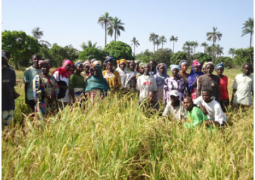The United Nations Food and Agriculture Organization (FAO), the United States Department of Agriculture (USDA), the United State Agency for International Development (USAID) and the Ministry of Agriculture of The Gambia in collaboration with France Veterinaries International (FVI) on Monday commence a five-day technical forum on laboratory equipment maintenance and basic metrology at Kairaba Beach Hotel.
The forum among others seeks to improve the technical capacity of national veterinary diagnostic laboratories in our region through training, logistics and technical support, exchange of technicians and transparent sharing of information within a sustainable framework.
Speaking on behalf of the minister of agriculture, Dr. Kebba Daffeh said Gambia has been a key partner in West and Central Africa Network of Diagnostic Veterinary Laboratories since its launching in Bamako Mali in 2007 by FAO and partners with the objective of improving the technical capacity of all national veterinary diagnostic laboratories in our region.
He stated that in 2009, the Gambia hosted the RESOLAB workshop on implementing quality assurance system in veterinary diagnostic laboratories.
While commending the FAO for organizing another forum to further strengthening the existing quality systems, Dr Daffeh said in The Gambia and indeed other countries in the sub region, strengthening laboratory diagnostic capacity is considered as a very important component in effectively dealing with TADs.
“It is in this light that the forum on management of equipment and basic metrology in veterinary laboratories is seen by the ministry of agriculture to be very much in line with the training needs to strengthen diagnostic capacity of the central veterinary laboratory,” he added.
Dr Daffeh expressed hope that the forum will contribute significantly to the strengthening of the national diagnostic capacities and further strengthen existing quality assurance systems, noting that participants will make best use of the opportunity and ensure that the implementation of the recommendations and resolutions.
For his part, Dr. Babagana Ahmadu, FAO country representative in the Gambia said the incursion of highly pathogenic avian influenza H5N1 in Africa, in early 2006 has attracted the attention of the international community on the African continent’s weaknesses of Africa’s veterinary services and therefore promoted the launching of formal veterinary diagnostic networks as a means to standardize laboratory testing methods, pool resources, streamline communications and share information.
For three years now, he went on, RESOLAB and EARLN networks assisted the region laboratories to produce and implement specific roadmap for strengthening their respective system.
Dr Babagana stated that the workshop in Banjul is to take a further step in building strong quality system, and will cover one of the most challenging tasks of our laboratories that are equipment maintenance and calibration.
“Indeed, the difficulties experienced in this field come from the lack of resources to pay for routine maintenance or regular calibration of equipment’s, the lack of local competence to undertake such task or simply the absence of well-organized equipment’s, management program facilitating such operations,” he added.
According to him, it is recognized that all laboratories should have a well-organized equipment management programs, to address all aspects ranging from equipment selection, installation, preventive maintenance, procedures for troubleshooting and repair.
He stated that the forum intended to improve each participant’s skills in developing and implementing an equipment management program that meets the requirements of internationally recognized ISO 17025 standard for diagnostic laboratories.
The FAO Gambia boss also expressed hope that at the end of the forum, participants will be in a position to develop and apply basic laboratories equipment maintenance and calibration programmes adapted to suit their laboratory environment and needs.
He revealed that FAO’s Regional Emergency Centers for Transboundary Animal Disease Units (ECTAD) are part of the organization’s early response to provide close and tailored technical support to member states, thus assured that these units and the FAO representations are standing by your side for service delivery for the exclusive benefit of your countries and their people.
Dr. Connie BACON USA/APHIS expressed gratitude to FAO and USDA-APHIS for selection of the Gambia to host this very important forum.
She also commended the people and government of the United States of America for providing the funding for this very important training.
Three years now, RESOLAB and EARLN networks assisted the region laboratories to produce and implement specific roadmap for strengthening their respective system, thus to date not less than six regional workshops were organized in Eastern, central and western Africa.
The workshop in Banjul is to take a further step in building strong quality system; this will cover one of the most challenging tasks of our laboratories that is equipment maintenance and calibration.
Indeed, the difficulties experienced in this field come from the lack of resources to pay for routine maintenance or regular calibration of equipment’s, the lack of local competence to undertake such task or simply the absence of well-organized equipment’s, management program facilitating such operations.
According to officials, the epizootic of H5N1 avian influenza, which has begun in 2003 in South Asia and reached Africa in 2006, has negatively affected the sustainability of the livelihoods of many communities, endangering public health worldwide.
Indeed, the high mortality caused by the disease on poultry and massive slaughter that followed resulted in losses of millions of birds due to its zoonotic nature (disease common to humans and animals). The disease has killed 356 people out of 603 confirmed cases according to WHO May 2012 report.
The H5n1 avian influenza crisis highlighted the limited structural and operational capacity of our veterinary services. It has served to leverage the international community’s strong mobilization for our continent, mobilization that led to the launching of the West and Central Africa Network of Veterinary Diagnostic Laboratories for avian influenza and other transboundary disease.
For comments, suggestions, and contribution email AS anchorman at saineymarenah@ymail.com or call +220-3471343.
Read Agricultural spectrum every Tuesday for insightful news and agricultural current affairs.
Agricultural Spectrum Catchword of the Week: “investment in laboratory is key to research.”


